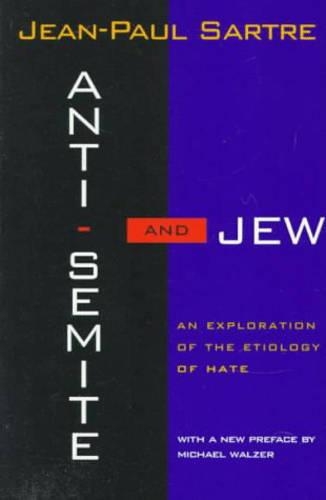
Anti-Semite and Jew: An Exploration of the Etiology of Hate
(Paperback)
Publishing Details
Anti-Semite and Jew: An Exploration of the Etiology of Hate
By (Author) Jean-Paul Sartre
Random House USA Inc
Random House USA Inc
25th April 1995
25th April 1995
United States
Classifications
General
Non Fiction
Social discrimination and social justice
Ethnic studies / Ethnicity
Racism and racial discrimination / Anti-racism
305.8924
Physical Properties
Paperback
176
Width 130mm, Height 201mm, Spine 12mm
147g
Description
With a new preface by Michael Walzer Jean-Paul Sartre's book is a brilliant portrait of both anti-Semite and Jew, written by a non-Jew and from a non-Jewish point of view. Nothing of the anti-Semite either in his subtle form as a snob, or in his crude form as a gangster, escapes Sartre's sharp eye, and the whole problem of the Jew's relationship to the Gentile is examined in a concrete and living way, rather than in terms of sociological abstractions.
Reviews
"[A fervent and brilliant challenge to ant-Semitism."
The New York Times
"A review . . . can merely indicate the humanity, the compassion, and the suggestive brilliance of Sartre's writing. His essay is a genuine contribution to contemporary thought; it will be read and reread in years to come."
Harvey Swados
"Still a monument of postwar writing on anti-Semitism . . . Michael Walzer's fine introduction will help current readers sift out what remains relevant from Sartre's work for considering the variants of anti-Semitism haunting the world today."
Elisabeth Young Bruehl
"Sartre's account of anti-Semitism is an acknowledged classic, based in large measure on assimilated Jews whom he personally knew. Michael Walzer's essay provides significant balance to Sartre's brilliant analysis."
Arthur Hertzberg
Author Bio
JEAN-PAUL SARTREwas born in Paris in 1905. Educated at the Ecole Normale, he then taught philosophy in provincial lycees, and in 1938 published his first novel, Nausea. During the war he completed the major work that eventually established his reputation as an existential philosopher-Being and Nothingness (1943). After the Liberation, he founded the socialist journal Les Temps Modernes. Hewas a prolific playwright, producing, among other works No Exit, The Devil and the Good Lord, and The Condemned of Altona. In 1960, he published his second basic philosophical work, Critique of Dialectical Reason. In 1964, his account of his childhood, Words, received worldwide acclaim. That same year he was awarded the Nobel Prize for Literature, which he refused. In 1971-1972, the first three volumes of his ambitious study of Flaubert's life and work appeared. He died in 1980.
